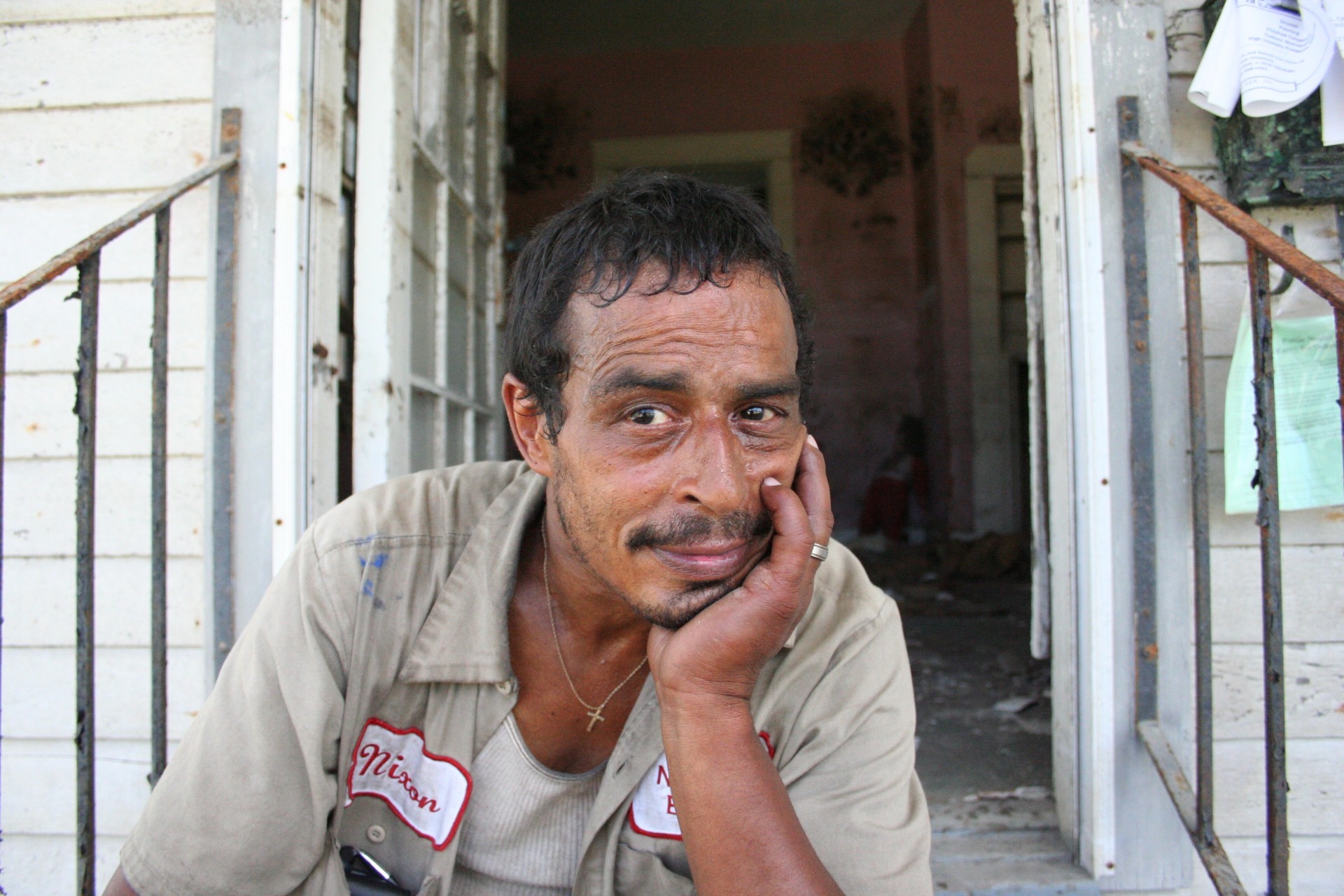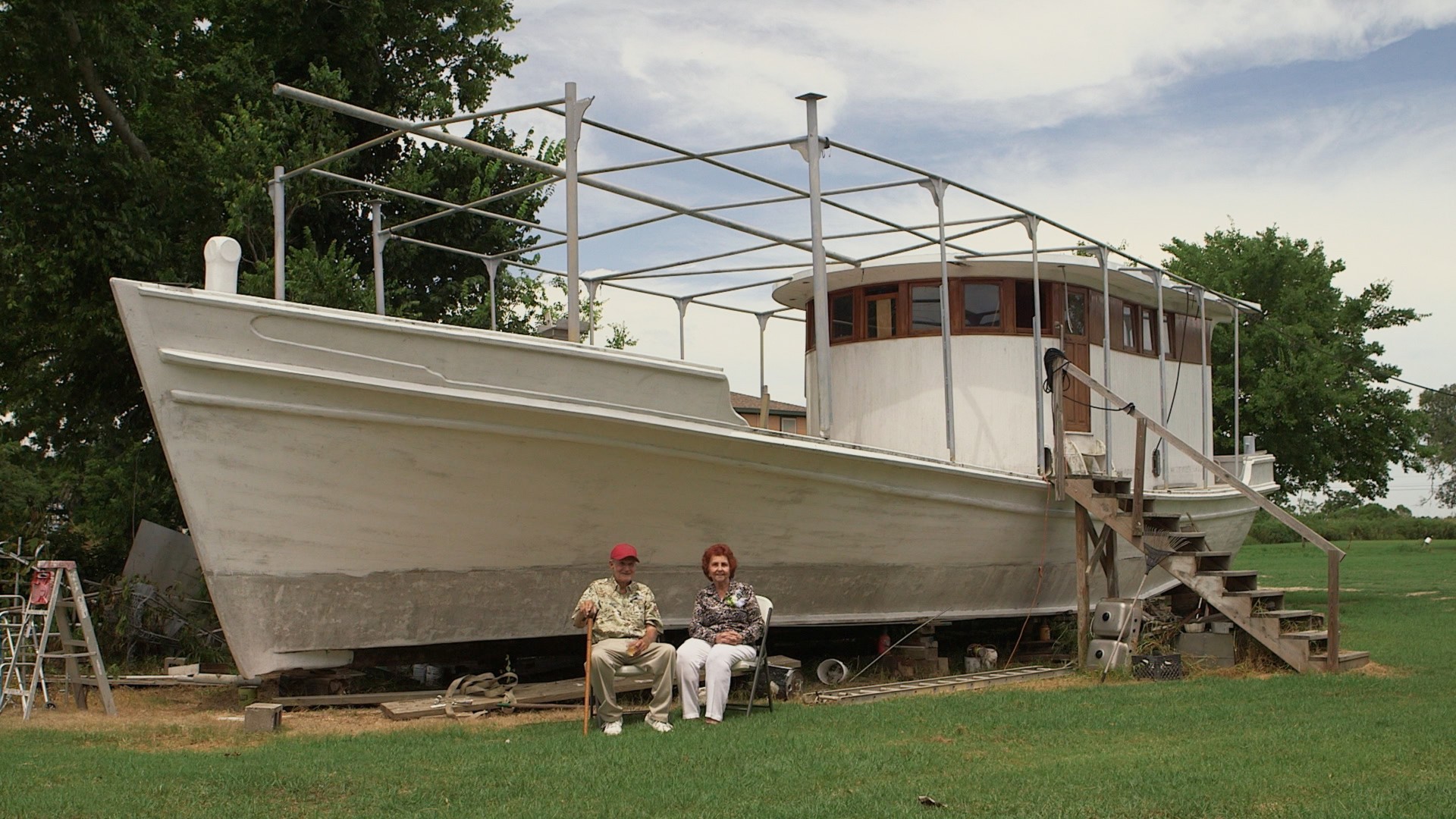LSU’s Zachary Godshall Reflects on Hurricane Katrina’s Lasting Impact Through Filmmaking
August 26, 2025
LSU alum and Associate Professor in the Department of English and Screen Arts Zachary Godshall has spent the last 20 years turning the devastation of Hurricane Katrina into stories that explore the environment, as well as the loss, resilience, and love of its people.
Beginning with his debut film “Low and Behold,” to later works like “The Boatman,” Godshall has rooted his career in Louisiana landscapes and communities.
Godshall, an associate professor in English and Screen Arts, grew up in Lafayette, Louisiana and was living there when Hurricane Katrina made landfall.

A still from the film "Low and Behold," featuring actor Eddie Rouse.
– By Jillian Johnson
“Lafayette was untouched by the storm itself, however, many friends were affected, including my sister, who lost her apartment and car in the flood,” Godshall said.
At the time, Godshall was teaching film production at South Louisiana Community College while helping students document the stories of displaced individuals housed in the Cajundome, due to the storm.
Affected friends and family, as well as the stories of the displaced individuals, inspired Godshall to create “Low and Behold” with his friend, and actor, Barlow Jacobs.
“This was the beginning of a major turning point in my creative and personal development,” Godshall said.
There was some trial and error while Godshall and Jacobs filmed “Low and Behold” in post-Katrina New Orleans, due to trying to balance the emotional weight of the subject matter with the creative process of storytelling. This forced Godshall to abandon his traditional filmmaking methods, and instead he learned to adapt, collaborate, and improvise
“Working in this way with a small crew and a mixture of professional and non-professional actors forced me out of my comfort zone,” Godshall said. “Way out.”
Godshall recalled a time when he was filming from a moving car in the Lower Ninth Ward, and a woman shouted at him to not point his camera at her. This moment pushed Godshall to rethink how to capture the devastated city of New Orleans and the emotion of its people.
“The most honest, and perhaps most powerful, way to portray the devastation that surrounded us was to show it indirectly, by way of restraint,” Godshall said.
After filming was wrapped, “Low and Behold” was shown at the Sundance Film Festival in 2007. Godshall recalled the silence, and delayed applause, he heard after his film ended. To him, the silence meant the film had touched the audience deeply.
“Low and Behold” taught Godshall the importance of audiences and continues to shape the way he makes his films and his approaches to storytelling.
“They did not clap. Instead, they sat in silence until the music faded out,” Godshall said. “The audience remains the final and perhaps most important collaborator.”
“Low and Behold” inspired Godshall to create other Louisiana stories, including his 2015 documentary “The Boatman,” which focused on an aging couple from St. Bernard Parish who survived Hurricane Katrina. The film was selected to play at the Museum of Modern Art in New York City in August, as part of their commemoration of Hurricane Katrina’s 20th anniversary through cinema, When the World Broke Open.
“The couple celebrate their 71st wedding anniversary in the film, and it’s easily the most joyous moment I’ve ever had the honor to include in a film,” Godshall said.

Joseph and Selina Gonzales from the film "The Boatman"
– By Zachary Godshall
Using these experiences, Godshall often introduces himself to his students by explaining his Lafayette roots, how he studied at LSU, and how Hurricane Katrina reshaped his career as a filmmaker.
Now, as he builds upon his 20-year career of filmmaking, Godshall continues to explore water and its role in shaping Louisiana’s identity. He is currently working on a storytelling bridge between Louisiana and the Netherlands because of their environmental commonalities.
“I received a Fulbright Scholar Award to spend next semester at TU Delft in South Holland where I will teach filmmaking and storytelling, thus creating imaginative connections between two of the world’s greatest river deltas,” Godshall said.
Godshall hopes his students, and audiences, feel touched by his films, whether being moved to tears and unexpected laughter, or to think differently about their own relationship with their environment.
“I hope audiences remember fondly these faces and these places, and that in recalling them, they feel tenderness and even love,” Godshall said. “Beyond that, whether they are from Louisiana or not, I hope the films inspire people to think in new ways about their own relationships to land, water, and their neighbors.”
Turning Tragedy into Impact
Explore LSU’s role in response, recovery, resilience, and research following Hurricane Katrina.


